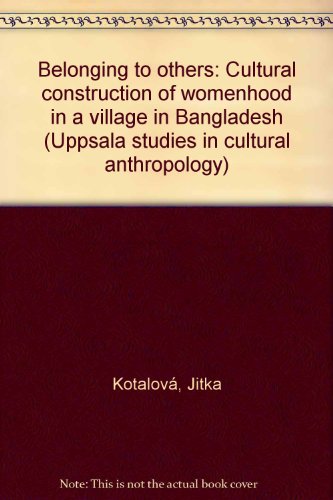
- Shop
- Belonging to Others: Cultural Construction of Womenhood in a Village in Bangladesh
Belonging to Others: Cultural Construction of Womenhood in a Village in Bangladesh
https://uplbooks.com/shop/9840513214-belonging-to-others-cultural-construction-of-womenhood-in-a-village-in-bangladesh-6375 https://uplbooks.com/web/image/product.template/6375/image_1920?unique=3d813f3
| Language: English |
Tags :
Book Info
This is a study of social organization, focusing on the symbolic construction of womanhood in the Muslim peasant community in Bangladesh. In the patriarchal, patrilocal, patrilineal society of Bangladesh, socio-cultural values sanction the segregation of sexes, impose strict gender division of labor and foster a systematic bias of male supremacy (Roushan Jahan, 1983). Marriage is also seen as an exchange for security by which women obtain protection in return for the opportunity to provide the continuity of patrilines. Thus a woman is rendered transferable. Her experience of social structure leads her into an ambiguous position- her sense of belonging is divided between her father's and husband’s home. Therefore the questions central to this study are: How does a society that sustains the invisibility and muteness of women, construct womanhood from birth to marriage? If women constitute a separate category from men, as suggested by their veiling and ritual exclusion on the public scene, how is their sense of belonging (or separateness) organized, articulated and reproduced in various cultural domains? If the dominant structure and ethos are articulated in terms of male position and orientation, what are the cultural provisions for the articulation of muted, non-dominant views? How do women assimilate themselves into the structure that subordinates them? The answers to these questions are attempted in Belonging to Others.

Jitka Kotalova
Jitka Kotalova has received her doctoral degree in cultural anthropology at the Uppsala University in Sweden. She is currently shifting her ethnographic focus from South Asia to her native tribe-the agriculturists in the Czech Republic. Her research project concerns the tropical creativity accompanying the process of decollectivization in the villages of South Eastern Bohemia.

জিত্কে কোটালভা
Jitka Kotalova has received her doctoral degree in cultural anthropology at the Uppsala University in Sweden. She is currently shifting her ethnographic focus from South Asia to her native tribe-the agriculturists in the Czech Republic. Her research project concerns the tropical creativity accompanying the process of decollectivization in the villages of South Eastern Bohemia.


